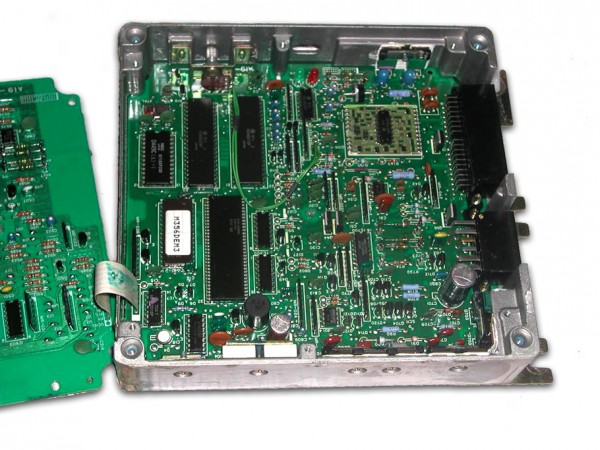Ever since the internal combustion engine was invented,
men have been trying to increase its power output.
In the old days before engines were run by computers,
this was a purely mechanical affair.
You would fiddle around with carbutetors and such, and hopefully gain a few horsepower that you could brag about to your next door neighbour.
But technology has a way of progressing, and by the late 20th century every car coming off the production line had a computer brain to control every parameter that makes the engine run. There are many boring benefits to having these ECU’s — engine control units. But what the «boys and their toys» care about: what can we do to it that will make the car go faster?
As luck would have it, the age of the computer is a golden age for car tuners. When car manufacturers are putting together your car, they are programming the ECU to produce exactly the amount of horsepower and torque that they want to get. This is not always the maximum amount the engine is capable of producing. Usually engines are programmed to deliver less power than they can, again for very boring reasons. Fuel consumption, pollution….in some countries even for tax reasons power will be restricted to a certain level to end up in a lower tax bracket.
The good news is, computers can be given new instructions and they will execute them without any questions. Computers are stupid, and that’s a good news when you want it to release those wild horses hidden inside your engine somewhere.
In today’s world, tuners can make your car faster without even getting their hands dirty. A laptop with some complicated software running on it is all it takes to re-program the ECU with new parameters.
Before we all get overexcited, I should point out that not every car is worth «chiptuning» as the practice is lovingly called. As a general rule of thumb, engines that are not equipped with a turbocharger will not be able to gain much power. Unless it is a particularly large engine, the cost of tuning the ECU is usually not worth the gains.
![]()
For turbo cars however, it’s a different story. To understand the difference, we need to understand the engine. How much power it produces is determined for the most part by how much air it is able to swallow. Naturally aspirated engines are limited to the capacity of their cylinders, because they cannot suck in more air than they have room for. Air and fuel are needed to produce power, and the ratio of air to fuel must be exactly right. Adding more fuel when you are not getting extra air would cause a loss of power instead of a gain.
A turbo is a way of forcing air into the engine. Because the air will enter the engine at high pressure, a larger mass of air will fit into the same space as before. Because we now have more air, we can add more fuel and get more power. More power means a smile on our face.
Turbochargers are controlled by the ECU, so when the ECU allows the turbo to work a bit harder than usual, more air will get into the engine and…you guessed it.
![]()
Both gasoline and diesel cars fitted with a turbo can see significant gains from altering the computer’s programming. Depending very much on the specific car and model, you can expect to see gains of 15 to more than 25 percent. If you have a 200 horsepower car, you could well end up with 250 horsepower after reprogramming. That’s something you’ll really notice. And on top of the power gains, you can expect similar fuel economy as before. It’s magic!
Where’s the catch then, you ask?
Well this tuning business is generally not as cheap as you would think. You’ll want a tuner with a good reputation, so prepare to pay money for the honour of having a professional work on your car. Incorrect tuning can very well cause serious damage so this is not something you want to leave to amateurs.
Also, because your engine components are being stressed a bit harder, they will wear slightly faster. But generally speaking this effect is small and you are unlikely to encounter mechanical problems from a 15-25% power increase. Still, altering the program could invalidate any warranty your car has so look into this beforehand.
The final concern is that after getting a taste of more power, you will want even more power after this. This is where things get expensive and wives or girlfriends get angry.
Ultimately there are many things you can do to a car that will make it produce silly amounts of horsepower. Some cars that came from the factory with 300 horsepower can be found on youtube now with more than 1000. It depends how deep your pockets are, and how much G-force you want to experience when your right foot hits the accelerator.
From this perspective, merely tuning your ECU is a bargain. It’s the cheapest horsepower you will ever buy and your car looks and sounds exactly as it did before. So you can even tell your wife that it’s all in her imagination that your car seems faster than the day before. Everything’s fair in love and war. Well, when I say war, I really mean cars.
| The author of this article once tuned his own Volvo 850 race car from 240hp standard to 450 horsepower |











